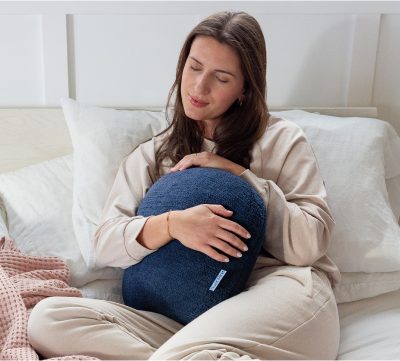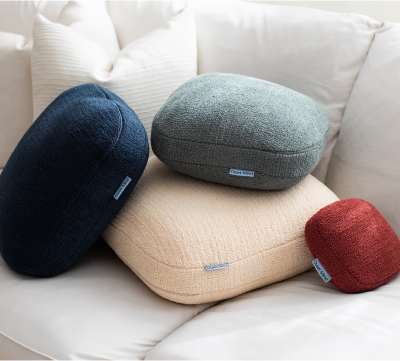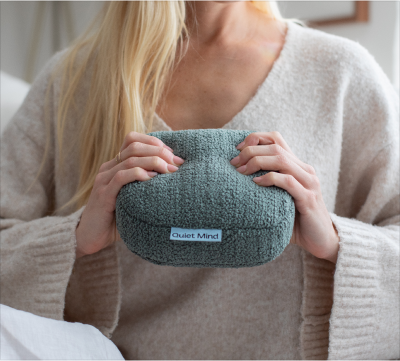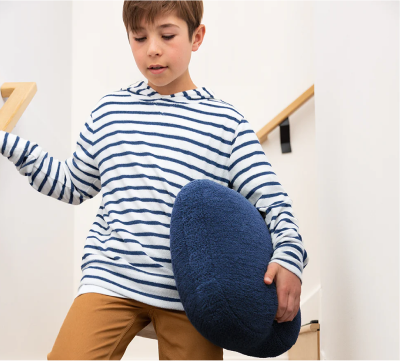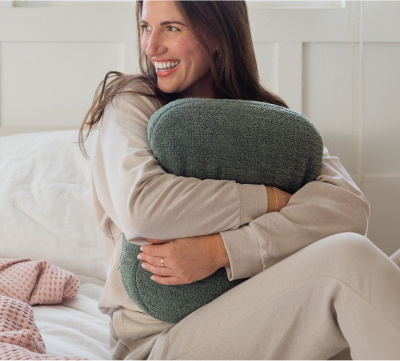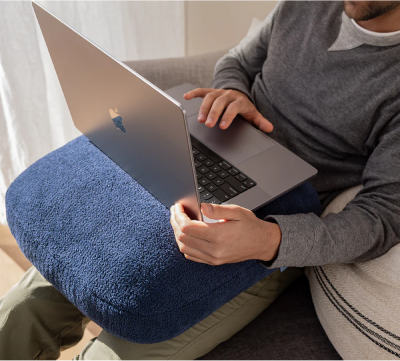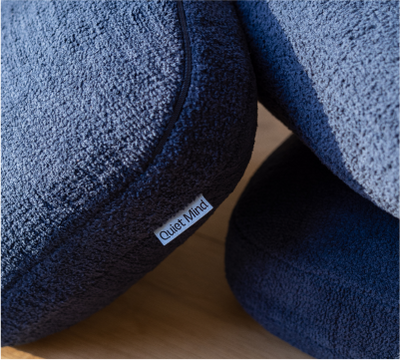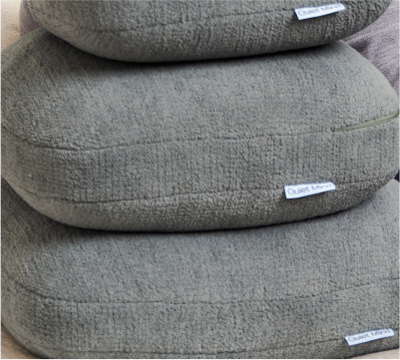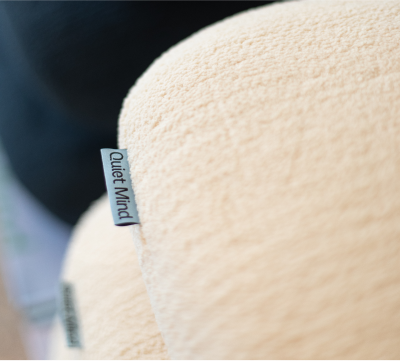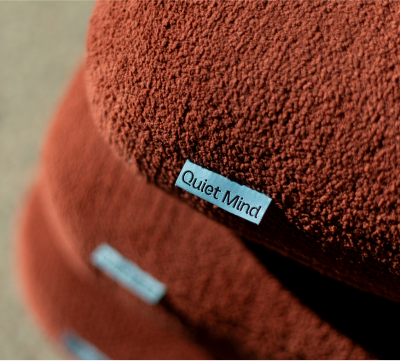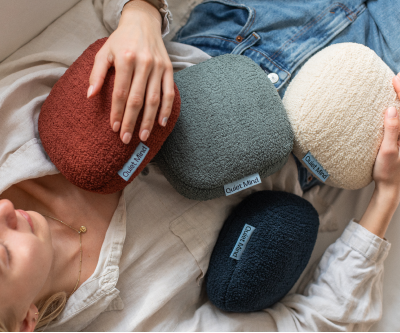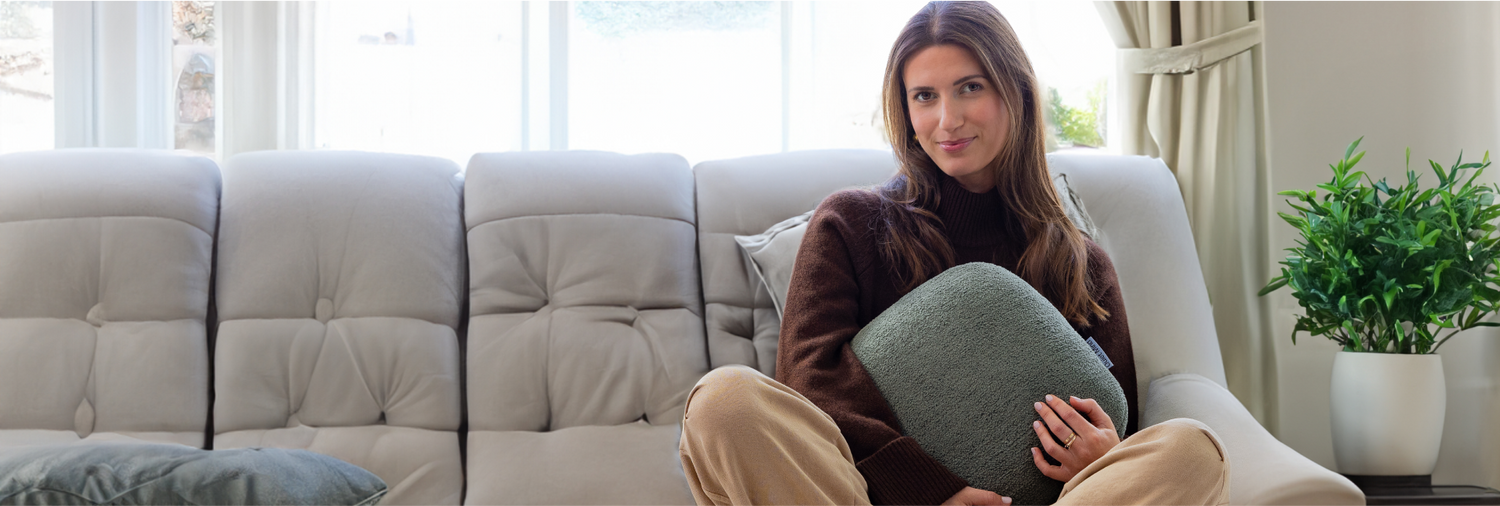Each night, we search for stillness, not just sleep, but the kind that restores us. For people navigating stress, restlessness, or sensory overload, the need for calm goes beyond counting hours. It’s about regulating a nervous system that never fully powers down.
This is where weighted blankets enter the conversation. Their steady, grounding pressure offers more than comfort, it offers a kind of physical reassurance that tells the body it’s safe to let go. But can that comfort be part of your routine every single night? And what happens when it is?
In this guide, we’ll explore whether it’s okay to sleep with a weighted blanket every night. We’ll also look at how it may help improve sleep quality, reduce anxiety, and support emotional regulation, especially for those living with sleep disorders, ADHD, or autism spectrum disorder.
What Happens When You Sleep With a Weighted Blanket Every Night?
Night after night, the body begins to recognize patterns. Weighted blankets work by applying deep pressure; a gentle, evenly distributed weight that signals the nervous system to slow down.
This has effects not just on how long you sleep, but on how deeply you rest.
Effects on Sleep Quality and Duration
Studies on the effectiveness of weighted blankets have shown promising results; especially when used regularly over time. People often report feeling more grounded at bedtime, less anxious upon waking, and more consistent in their sleep cycles.
In clinical settings, some individuals using weighted blankets showed:
- Fewer awakenings during the night.
- Increased time spent in deep, non-REM sleep.
- Shorter time to fall asleep.
- Improved feelings of restfulness in the morning.
Weighted blankets may help improve sleep quality not just by increasing total sleep time, but by making that time more restorative. A nervous system that feels safe is more likely to release into deeper sleep cycles, which can support everything from emotional regulation to immune health.
Influence on Anxiety and the Nervous System
Anxiety doesn’t always wait until morning. For many, it arrives quietly at night, a racing heart, spiraling thoughts, or that familiar edge of unease just as you're trying to rest. This is where the pressure of a weighted blanket may help soothe the nervous system into stillness.
Weighted blankets help calm the body by activating deep pressure receptors in the skin and muscles. This steady, enveloping pressure can trigger the release of serotonin and oxytocin, neurotransmitters associated with emotional stability and connection, while decreasing levels of cortisol, the body’s primary stress hormone.
The result? A potential reduction in nighttime arousal, intrusive thoughts, and pre-sleep restlessness. This calming effect may be especially helpful for individuals with Attention Deficit Hyperactivity Disorder, where regulating emotional and sensory input can be especially difficult.
Many people find that a weighted blanket helps lower their heart rate, create a feeling of groundedness, and ease the transition from wakefulness to sleep. It doesn't replace therapy or other forms of care, but for some, it becomes a meaningful part of a broader mental health routine.
Is It Safe to Use a Weighted Blanket Every Night?
For most healthy adults, the answer is yes, using a weighted blanket every night is generally considered safe. But “safe” is personal. It depends on your health status, body size, and whether the blanket supports your comfort and freedom of movement.
Like any supportive tool, it requires attention to the details of your body, your environment, and any existing sleep disorders or medical conditions.
Safety Considerations Based on Weight and Body Type
The general guideline is to choose a weighted blanket that’s around 10% of your body weight. This ensures the blanket feels calming rather than heavy or constricting. But individual preferences matter just as much.
Here’s a simple breakdown:
- For adults: 10–20 lbs is typical, depending on your weight and comfort level.
- For smaller-framed individuals or teens: Lighter blankets around 7–12 lbs may feel more manageable.
- For larger bodies: Heavier blankets may feel more naturally supportive, as long as mobility isn’t compromised.
Pay close attention to how you feel under the blanket. If you wake up sweaty, stiff, or unable to shift positions easily, it might be too heavy, or not breathable enough for nightly use.
When Nightly Use Might Not Be Recommended
While weighted blankets are widely used to improve sleep and reduce anxiety, they’re not the right fit for everyone. In some cases, nightly use may pose challenges, especially if underlying health concerns make it harder to breathe or move freely under pressure.
If you live with a sleep disorder like obstructive sleep apnea, where airflow is already compromised, the added weight on your chest may increase discomfort or breathing difficulty. Similarly, for individuals with chronic respiratory or circulatory conditions, extra pressure during sleep should be approached with caution and medical guidance.
Other groups that may need to avoid or modify daily use include:
- Older adults with limited mobility or strength.
- Young children under age 2, due to suffocation risk.
- People with claustrophobia or strong sensory aversions.
- Those recovering from surgery or injury affecting mobility.
Even if a weighted blanket helps reduce anxiety or soothe the body, it should never create a sense of restriction or panic. The goal is comfort, not confinement. If it begins to feel overwhelming or difficult to move beneath, even occasionally, that’s a cue to reassess.
Benefits of Using a Weighted Blanket Daily for Sleep
When chosen thoughtfully and used in alignment with your body’s needs, a weighted blanket may help you build a nightly sleep routine that feels safe, steady, and restorative.
Enhanced Sleep Cycles
Over time, the consistent use of a weighted blanket can help regulate the body’s circadian rhythm, the internal clock that governs sleep-wake patterns. The deep pressure may increase the production of melatonin, the hormone that signals your brain it’s time to rest.
Many people report that a weighted blanket:
- Helps them fall asleep faster.
- Reduces tossing and turning during the night.
- Deepens slow-wave sleep, the most restorative phase.
- Minimizes middle-of-the-night wakeups.
- Improves overall sleep quality, especially during times of stress.
For individuals with attention deficit or attention deficit hyperactivity disorder (ADHD), where sleep onset and restlessness are common challenges, this kind of reliable sensory input can become a valuable tool in the bedtime routine.
Support for Stress, ADHD, and Sensory Needs
Weighted blankets help support emotional regulation, particularly in people with heightened sensitivity to stimuli. Those on the autism spectrum or living with sensory processing differences often find that the pressure of a blanket creates boundaries around the body that feel predictable and calming.
Night after night, this simple, consistent pressure can:
- Reduce bedtime anxiety.
- Create a sense of security in the body.
- Support sensory integration.
- Offer non-verbal comfort in overstimulating environments.
Can Your Body Get Too Used to a Weighted Blanket Over Time?
This is a common concern, and an understandable one. If a weighted blanket becomes part of your nightly routine, will your body begin to rely on it to fall asleep? Is that kind of dependency healthy?
The short answer: it depends on how it's used, and how it makes you feel when it’s not there.
Understanding Habituation
Habituation is a natural process, it’s how the body adapts to repeated experiences. If you’ve used a weighted blanket consistently, you might notice that the calming effect feels less pronounced over time. This doesn’t mean the blanket has stopped working. More often, it means your nervous system has settled into a steadier, more regulated state.
Rather than chasing that initial “wow” moment, it’s helpful to view habituation as a sign of progress. When your body begins to expect calm instead of resisting it, the blanket has become part of a deeper rhythm, not just a reaction, but a ritual.
For individuals with Attention Deficit Hyperactivity Disorder or those on the autism spectrum, this ongoing use may continue to offer meaningful support. Even if the sensory input feels subtler with time, the weighted blanket may help regulate heart rate, ease transitions, and create a predictable signal that it’s safe to rest.
In that way, habituation isn’t a loss, it’s integration.
Healthy Sleep Dependency vs. Unhealthy Habituation
It's okay to need support, the key is whether the tool helps you function with more flexibility, not less. Here’s a helpful way to think about it:
|
Aspect |
Healthy Dependency |
Unhealthy Habituation |
|
Sleep Quality |
Improves with blanket, still manageable without |
Sleep becomes significantly worse without it |
|
Usage |
Integrated into a calming routine |
Used rigidly, without variation |
|
Adaptability |
Can sleep elsewhere when needed |
Difficult to sleep without exact conditions |
If you're concerned about becoming too reliant, you can rotate in other calming tools such as breathwork, gentle movement, or Quiet Mind's scented weighted pillow, to support your system in different ways.
How to Choose the Right Weighted Blanket for Nightly Use
The right blanket doesn’t just feel heavy, it feels right. Supportive. Soft. Safe. When chosen well, a weighted blanket may help improve sleep by calming the nervous system without creating overheating or discomfort.
Ideal Weight and Size for Comfort
The standard guidance for picking a weighted blanket as per weight is to choose one that’s about 10% of your body weight. But comfort isn’t one-size-fits-all; you may prefer more or less pressure depending on:
- Your height and sleep position.
- How much you move at night.
- Whether you share your bed or sleep alone.
The blanket should rest gently over your body without dragging over the sides of the bed. If it feels restrictive, or hard to reposition, it may be too heavy or poorly sized.
Breathability, Fabric, and Maintenance Tips
A breathable blanket can make all the difference between feeling cocooned and feeling trapped. Look for:
- Cooling fabrics like bamboo, cotton, or temperature-regulating blends.
- Removable covers for easy washing and fabric longevity.
- Evenly distributed beads or fill, so weight stays balanced.
The inside material of the weighted blanket plays a key role in comfort, temperature control, and how evenly the pressure is applied. Proper maintenance supports both hygiene and comfort, which are two quiet factors that can deeply improve sleep quality over time.
Who Should Not Sleep With a Weighted Blanket Every Night?
Weighted blankets are not one-size-fits-all. While many benefit, some health conditions require caution or a tailored approach.
Specific Health Considerations
If any of the following apply, you should not use weighted blanket at night:
- Children under age 2: Due to the risk of suffocation, weighted blankets should never be used with infants or toddlers. Always follow pediatric guidelines.
- Older adults with limited mobility: Aging bodies may have difficulty adjusting or repositioning under the weight, which could increase fall or entrapment risk.
- Chronic respiratory or circulatory conditions: For those with asthma, COPD, sleep apnea, or poor circulation, added pressure on the chest or legs may interfere with breathing or blood flow.
- Neuromuscular disorders: Conditions that impair movement or strength (like muscular dystrophy or multiple sclerosis) may make it harder to safely reposition under a weighted blanket.
- Sensory aversions or trauma history: If the feeling of pressure triggers distress, anxiety, or flashbacks, especially for individuals with PTSD or heightened sensory defensiveness, the blanket may cause more harm than relief.
Even if a weighted blanket may help with anxiety, attention deficit, or autism spectrum traits, it must always feel like a source of safety not stress.
Consulting a Healthcare Professional
If you're managing a sleep disorder, medical condition, or simply unsure if a weighted blanket is the right fit, speak with a professional who understands your history. This is especially important for:
- People living with autism spectrum disorder who have variable sensory needs.
- Individuals with attention deficit hyperactivity disorder, where sleep struggles may have multiple root causes.
- Anyone exploring weighted support as a tool for chronic insomnia, trauma recovery, or emotional regulation.
A qualified provider can help you determine whether nightly use is appropriate, and recommend weight, fabric, or alternative options like weighted pillows or lap pads if full-body coverage isn't ideal.
Final Thoughts: Support That Stays With You
Weighted blankets aren’t just about the weight, they’re about the message that weight sends. That it’s okay to rest. That stillness is allowed. That your body can let go.
For many people, especially those navigating sleep disorders, anxiety, attention deficit hyperactivity disorder, or autism spectrum challenges, nightly use of a weighted blanket may help create a sense of grounded safety, a way to reconnect with the body and the breath before sleep.
These blankets aren’t a cure or a promise. But used consistently and thoughtfully, they can become a gentle part of a larger rhythm, one that supports nervous system regulation, emotional balance, and the opportunity to improve sleep quality night after night.
What matters most is how it feels for you.
About Quiet Mind
At Quiet Mind, we believe that rest isn’t something you have to earn, it’s something your body is wired for, when given the right support. Our resources and tools are designed to honor that need, especially for those living with stress, sensory sensitivity, or neurodivergence.
One of those tools is our signature weighted pillow, a smaller, versatile alternative to the full-body blanket. Designed to apply gentle pressure across the chest, lap, or shoulders, it offers many of the same calming effects in a more flexible, breathable form.
Whether you’re easing into sleep or grounding your body during the day, our weighted pillow can become part of your ritual for calm, connection, and steady emotional regulation.
We’re here to help you meet your nervous system where it is, with softness, not force.
Frequently Asked Questions
Is it safe to sleep with a weighted blanket every night?
For most people, yes especially when the blanket is properly sized and used correctly. Weighted blankets are generally safe for nightly use if they’re around 10% of your body weight and not overly restrictive. However, people with medical conditions should check with a doctor first.
Can a weighted blanket improve my sleep quality?
It can. Many users report deeper, more restful sleep, including falling asleep faster and experiencing fewer nighttime awakenings. This is largely due to the deep pressure stimulation the blanket provides, which may lower heart rate, reduce cortisol (the stress hormone), and support nervous system regulation.
How do I choose the right weighted blanket for nightly use?
Choose a blanket that weighs about 10% of your body weight; for example, a 150 lb person might use a 15 lb blanket. Breathable, natural fabrics like cotton or bamboo are ideal for temperature regulation. Also, consider your sleeping position, body temperature, and whether you’ll use the blanket alone or with a partner.
Can children and older adults use weighted blankets?
They can, but with extra caution. For children, always use a blanket designed specifically for their size and weight, never an adult-sized one and only under adult supervision. For older adults, especially those with limited mobility, poor circulation, or underlying medical conditions, it’s crucial to consult a doctor first.
Can I get too used to a weighted blanket over time?
You might develop a strong preference for it, especially if it becomes part of a comforting nighttime ritual. This isn’t necessarily harmful, but some people find it helpful to occasionally switch things up, such as using other calming tools like lavender aromatherapy.
Are weighted blankets suitable for people with insomnia or sleep apnea?
In some cases, yes particularly for insomnia rooted in anxiety, restlessness, or sensory sensitivity. Weighted blankets may help calm the body and create a sense of security that makes falling asleep easier.
